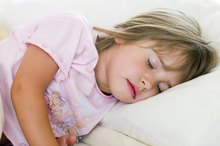Side Effects of a Melatonin Overdose
Melatonin supplements are a synthetic version of the naturally occurring hormone melatonin, which helps regulate your body's sleep-wake cycle. Taking appropriate doses of melatonin may help alleviate issues associated with sleeping problems, such as insomnia and jet lag, according to MedlinePlus. Before taking this supplement, discuss the side effects of a melatonin overdose with your medical provider.
Drowsiness
Severe drowsiness may occur if you take an unusually large dose of melatonin, Drugs.com warns. This supplement is typically used to induce sleep and may affect your ability to remain attentive or focused during your daily activities. Excessive drowsiness may cause you to fall asleep shortly after treatment and you may remain asleep for several hours.
Upset Stomach
Side Effects of Deglycyrrhizinated Licorice
Learn More
High doses of melatonin may irritate your digestive tract. Consequently, you may experience stomach irritation, nausea or vomiting following an overdose of melatonin. These side effects may also contribute to a decrease in your normal appetite. Consult a doctor as soon as possible if you experience severe stomach discomfort or persistent vomiting after taking melatonin.
- High doses of melatonin may irritate your digestive tract.
- Consequently, you may experience stomach irritation, nausea or vomiting following an overdose of melatonin.
Headache
Headache pain may arise following an overdose of this supplement. This side effect may interfere with your ability to focus on daily tasks and can exacerbate sensations of drowsiness or fatigue. If you develop sudden or severe headache pain after taking melatonin, seek care from your primary medical provider.
Related Articles
References
- MedlinePlus: Melatonin
- Buscemi N, Vandermeer B, Hooton N, et al. The efficacy and safety of exogenous melatonin for primary sleep disorders. A meta-analysis. J Gen Intern Med 2005;20:1151-8. doi:10.1111/j.1525-1497.2005.0243.x
- James M, Tremea MO, Jones JS, Krohmer JR. Can melatonin improve adaptation to night shift? Am J Emerg Med 1998;16:367-70. doi:10.1016/s0735-6757(98)90129-2
- Fischer, S., Smolnik, R., Herms, M., Born, J., and Fehm, H. L. Melatonin acutely improves the neuroendocrine architecture of sleep in blind individuals. J Clin Endocrinol.Metab 2003;88(11):5315-5320. doi10.1210/jc.2003-030540
- Gringras P, Gamble C, Jones AP, et al; MENDS Study Group. Melatonin for sleep problems in children with neurodevelopmental disorders: randomised double masked placebo controlled trial. BMJ. 2012 Nov 5;345:e6664. doi10.1136/bmj.e6664
- Jan, J. E., Hamilton, D., Seward, N., Fast, D. K., Freeman, R. D., and Laudon, M. Clinical trials of controlled-release melatonin in children with sleep- wake cycle disorders. J Pineal Res 2000;29(1):34-39.
- Nagtegaal JE, Laurant MW, Kerkhof GA, et al. Effects of melatonin on the quality of life in patients with delayed sleep phase syndrome. J Psychosom Res 2000;48:45-50. doi:10.1016/s0022-3999(99)00075-6
- Natural Standard. "Melatonin" Mayoclinic.com.
- PDRHealth. "Melatonin"
- Rossignol, D. A. and Frye, R. E. Melatonin in autism spectrum disorders: a systematic review and meta-analysis. Dev.Med.Child Neurol. 2011;53(9):783-792. doi:10.1111/j.1469-8749.2011.03980.x
- Sack RL, Brandes RW, Kendall AR, et al. Entrainment of free-running circadian rhythms by melatonin in blind people. N Engl J Med 2000;343:1070-7. doi:10.1056/NEJM200010123431503
Writer Bio
Rae Uddin has worked as a freelance writer and editor since 2004. She specializes in scientific journalism and medical and technical writing. Her work has appeared in various online publications. Uddin earned her Master of Science in integrated biomedical sciences with an emphasis in molecular and cellular biochemistry from the University of Kentucky College of Medicine.









